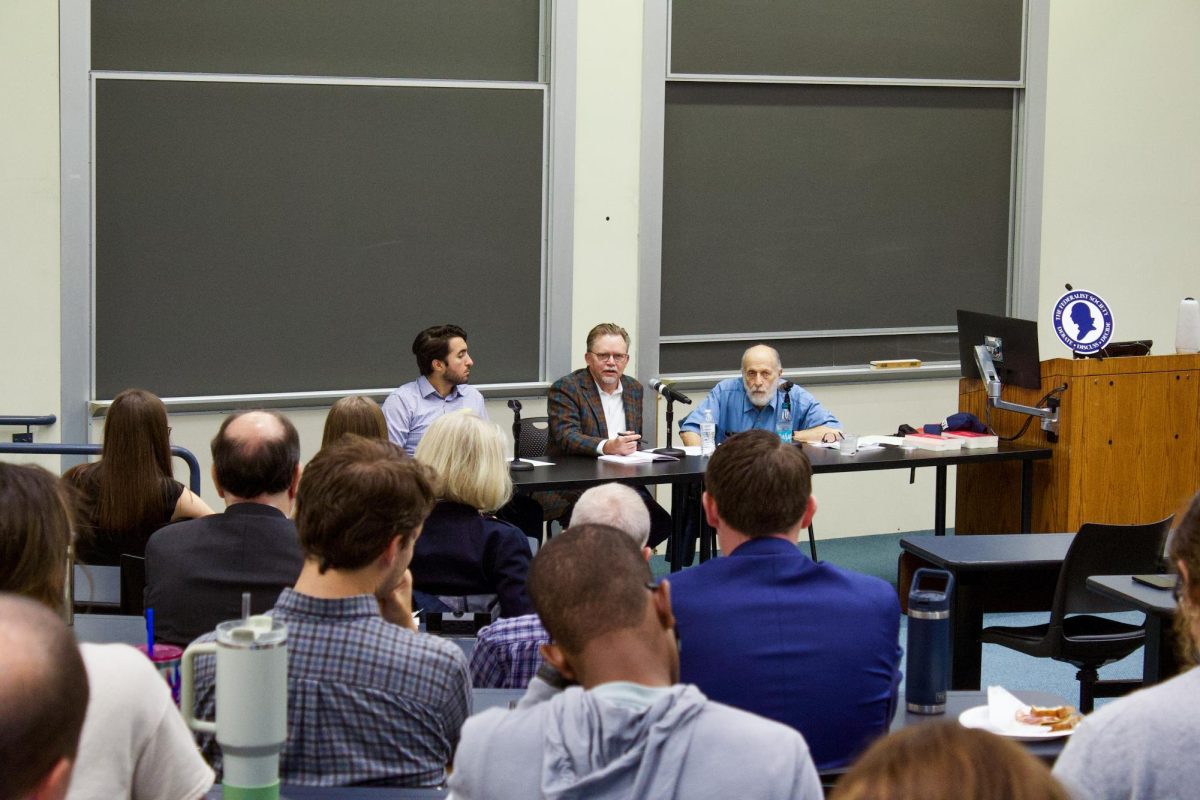On Wednesday, the issue of poverty in the United States was addressed in Stokes 195S by three Boston College professors in a panel called “The War on Poverty: A Hand Up or a Handout?” Professors Charles Derber, Marc Landy, and Richard Tresch represented the sociology, political science, and economic departments, respectively, in an event centered on American poverty.
The panel was co-hosted by the American Enterprise Institution (AEI) on Campus and UGBC. AEI on Campus connects college students with AEI regarding ideas, research, leadership, and community, while promoting conversation on campus about expanding liberty and strengthening free enterprise.
Tresch discussed the policy in place in the U.S. and the development of social welfare before and after the times of President Lyndon B. Johnson-initially only three populations qualified for aid.
“The idea was you had to be poor and something else, and the something else was society assuming that you weren’t in a position to help yourself,” Tresch said.
The programs were designed to aid the elderly, the blind, and dependent children in what became known as the widows’ program. Later, in the 1950s, citizens with disabilities were added to the main programs.
“When Johnson declared war on poverty, he also pushed through with his legislative skills the Great Society program,” Tresch said.
In 1965 Medicare and Medicaid began. Medicare, which was under the social security system, provided the elderly with hospitalization, and, for a small premium, physician’s services as well. In 2006, prescriptions were added to the program as well.
Medicaid was not considered a new program and instead was established to take the medical payments out of the other four original programs and put them under a uniform branch as an administrative action. Over time, Medicaid underwent significant expansion, and is now larger than all the other public assistance programs combined.
“We hardly ever talk about poverty anymore,” Derber said. “Since the war on poverty, we’ve either waged a War of Indifference-they are erased off the map, the poor-or we’re waging, in my view, a kind of war on the poor. We’ve moved from a war on poverty to a war on the poor.”
Derber illustrated the prevalence of poverty in life everywhere with the story of an adjunct professor, Margaret Mary Vojtko, from an article in the Pittsburgh Post-Gazette. She was living in extreme poverty, as most adjunct professors have no job security, no benefits, and a salary of about $3,000 to $3,500 per course, despite professors not typically being considered impoverished.
“I raise her as an example for two reasons,” Derber said. “One, poverty is not very far away from anyone. And, two, I think that this woman presents part of the new face of poverty.”
Derber also said power needs checks and balances. Countervailing power-power exercised by ordinary people-is declining and cannot counter big corporations as required. To solve the problem, Derber said, is to end the war on the poor, to change the language and image around poverty to include people like Margaret Mary, and to restore countervailing power.
Landy discussed the historical mood surrounding the poverty program’s initial needs to be understood. The urban rioting of the 1960s revealed that there were a number of serious pathologies within the poor that needed to be addressed.
“Whole sections of virtually every city erupted,” Landy said of the riots. “It was very powerful, this notion that a city could kill itself. What was saddest about the riots was that it was poor people destroying themselves.”
In order to fight poverty the program aimed to force these poor areas to operate at a high level of democracy through community action programs, Landy said. The community would vote on local representatives to allocate the money coming from the federal government. These community action efforts failed. The people would not vote, and the level of corruption and thievery of the councils elected became daily scandals. The stigma toward poverty programs stems from this good-hearted yet erroneous way of distributing money through a community action plan.
Concluding the panel was a question-and-answer session moderated by Matthew Alonsozana, UGBC executive vice president and A&S ’14. Questions on the current strikes of fast food workers, possibility of achieving low levels of poverty, and the place marriage has in fighting poverty prompted debate on poverty and moral obligations.
“This is fundamentally a decision to be made by society,” Derber said on the elimination of poverty. “I think that if our society were to say it’s unacceptable for children to be poor, I think that you could wipe out child poverty.”






